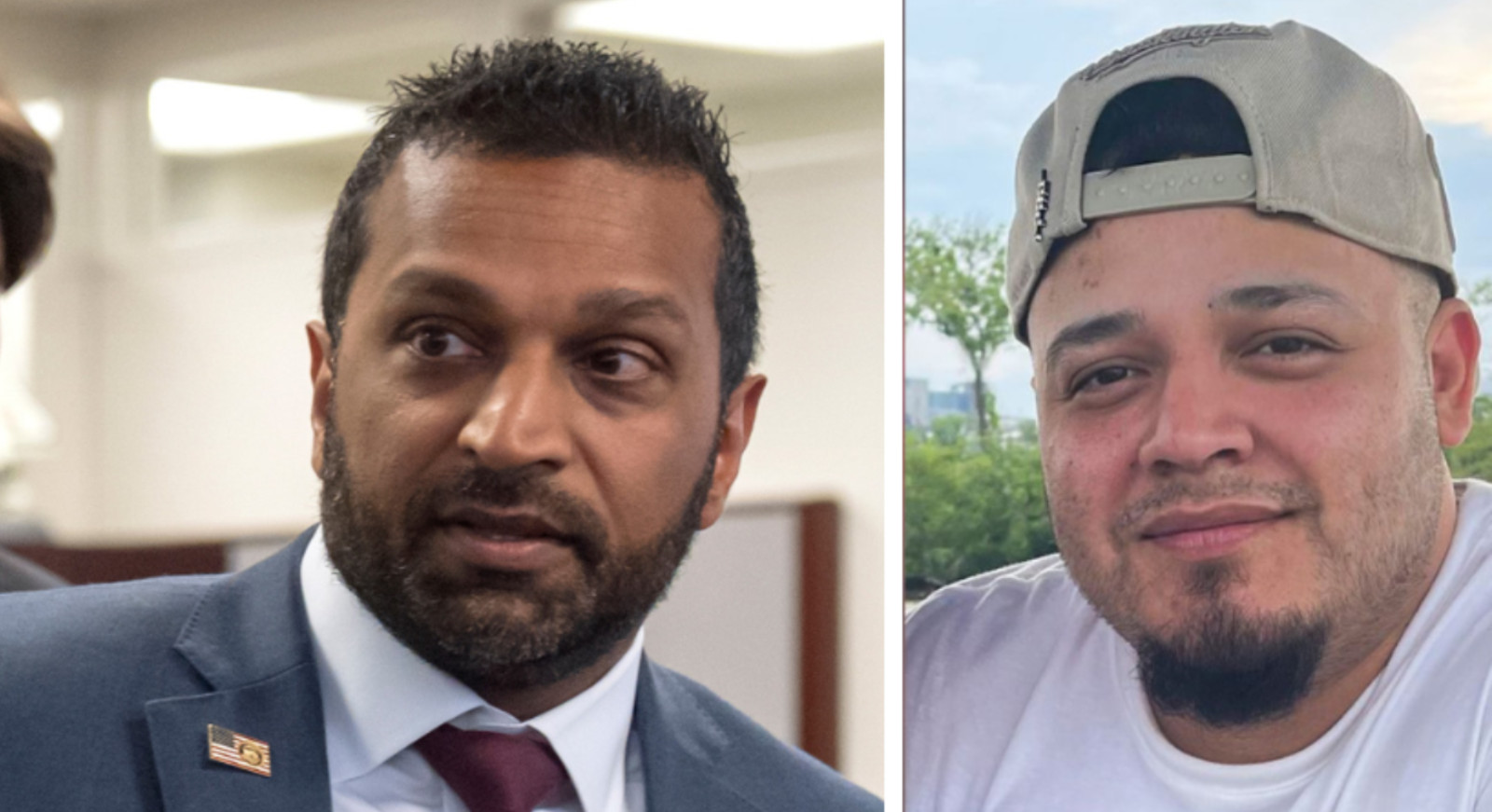In a development raising fresh questions about federal coordination on immigration enforcement, law enforcement sources tell Fox News that in late April 2025, FBI agents—acting under directives from the Department of Justice—advised Tennessee highway patrol officers to release Kilmar Abrego Garcia, a known MS-13 gang affiliate whom the Trump administration had deported to El Salvador just one month earlier. At the time of his interdiction in Tennessee, Abrego Garcia was suspected of involvement in a human trafficking and illegal immigration smuggling operation. This article provides an in-depth, professional account of the episode, explores its legal and political ramifications, and situates it within ongoing debates over immigration enforcement and executive authority.
1. The Tennessee Traffic Stop: Sequence of Events
On a routine nighttime patrol, Tennessee highway officers pulled over a vehicle traveling above the posted speed limit on Interstate 40 near Jackson, Tennessee. Upon approaching the car, officers discovered nine occupants: the driver, later identified as Kilmar Abrego Garcia, and eight others, all lacking any personal luggage or visible belongings.
Body-worn camera footage, obtained and aired for the first time by Fox Digital, reveals the following exchange:
Officer: “How are you?”
Abrego Garcia: “Good, and you?”
Officer: “I’m all right. You’ve got a lot of people in here, don’t you?”
Abrego Garcia: “Yes, go back to work.”
Officer: “Where are you working?”
Abrego Garcia: “Missouri.”
Officer: “Where do you live?”
Abrego Garcia: “Maryland.”
Moments later, as officers grew increasingly suspicious—given that none of the occupants had luggage or personal effects—Abrego Garcia was found to be carrying $1,400 in cash in an envelope, and officers indicated their belief that he was “holding these people for money,” a colloquial reference to human smuggling. After several minutes on scene, including a portion of the traffic stop during which one officer can be heard making a phone call, the camera cuts off.
2. Federal Intervention: FBI and ICE Involvement
According to two law enforcement sources, that phone call connected the Tennessee highway patrol to FBI field offices in the Eastern District of Tennessee. Within minutes, FBI agents—reportedly under guidance from the Department of Justice—advised state officers not to formally detain Abrego Garcia or the vehicle’s occupants. Tennessee authorities also attempted to reach U.S. Immigration and Customs Enforcement (ICE) to assume custody, but were informed that ICE resources were unavailable and that the matter should be referred back to the FBI. Ultimately, local officers released all nine individuals without taking them into formal custody.
3. Who Is Kilmar Abrego Garcia?
Kilmar Abrego Garcia first entered U.S. federal law enforcement databases in 2019, when he was arrested alongside several others in a multi-state investigation into an MS-13–affiliated human trafficking ring operating from Maryland into Virginia and Tennessee. At that time, he was charged with facilitating the transport of undocumented migrants—predominantly Salvadoran nationals—across state lines for profit. Following his conviction in federal court, the Trump administration deported Abrego Garcia to El Salvador on March 20, 2025.
Despite the deportation, Abrego Garcia reportedly reentered the United States via an overland route through Mexico and Texas in early April 2025, illustrating the durability of transnational smuggling networks and the challenges of securing the southern border.
4. The Supreme Court Ruling and “Facilitation” Requirement
In March 2025, Abrego Garcia’s legal team sought judicial review of his removal, obtaining a temporary injunction from the U.S. Supreme Court. The Court’s order directed the Biden administration to “facilitate” his return from El Salvador, citing due process concerns under the Convention Against Torture. Plaintiffs interpreted “facilitate” to mean an affirmative obligation by U.S. agencies to ensure his physical return. However, administration officials argue that “facilitation” is a broad term, allowing negotiations with Salvadoran authorities regarding the timing, method, and security measures for his repatriation. To date, diplomatic efforts have not yielded an agreed‐upon plan, and Abrego Garcia remains in limbo.
5. Political Reactions and Partisan Divide
The incident has quickly become a focal point for Republican criticism of the Biden administration’s immigration policies. GOP lawmakers and conservative commentators accuse the White House of undermining border security and abetting transnational crime by instructing local officers to release a convicted gang member. In contrast, Democratic leaders contend that the case is an isolated anomaly, highlighting the administration’s commitment to due process and international human rights obligations.
-
Republican Response: Senator Marsha Blackburn (R-TN) issued a statement demanding a congressional inquiry into DOJ directives that override state law enforcement’s judgment, arguing that the administration “is putting the safety of Tennesseans at risk.”
-
Democratic Response: House Majority Whip Katherine Clark (D-MA) cautioned against politicizing “an ongoing legal process,” asserting that the Supreme Court’s order “reflects complex treaty obligations that transcend simple law enforcement priorities.”
Internally, senior Democratic aides acknowledge concern over the optics and have reportedly urged members to postpone official trips to El Salvador, fearing that congressional visits may be overshadowed by protests or calls for accountability related to the Abrego Garcia saga.
6. MS-13: Background and Threat Assessment
Mara Salvatrucha, commonly known as MS-13, originated in Los Angeles in the 1980s among Salvadoran immigrants fleeing civil war. Over ensuing decades, the gang expanded rapidly across the United States and into Central America, engaging in extortion, drug trafficking, human smuggling, and brutal acts of violence. The U.S. Department of Homeland Security designates MS-13 as a “Tier 1 National Priority Gang,” citing its transnational reach and capacity to exploit vulnerable migrant populations.
Key characteristics of MS-13 operations include:
-
Extortion: Gang members demand “protection” payments from local businesses and communities.
-
Human Trafficking: Utilizing clandestine networks to transport migrants across borders in exchange for substantial fees.
-
Violence: Known for public displays of brutality, including machete assaults and targeted killings.
Understanding MS-13’s structure and tactics is essential to contextualizing the seriousness of Abrego Garcia’s alleged offenses and the public safety concerns at stake.
7. Federal vs. State Jurisdiction: A Legal Tightrope
The U.S. federal system delineates specific jurisdictions for state and federal law enforcement. While state police and highway patrol officers maintain authority to detain individuals suspected of state or federal crimes, federal agencies—such as ICE and the FBI—possess primary responsibility for immigration enforcement and national security threats.
Jurisdictional interplay in this case:
-
State Authority: Tennessee officers had probable cause to detain Abrego Garcia on suspected human trafficking and smuggling charges—both state and federal offenses.
-
Federal Preemption: Federal directives can supersede state actions when national interests—such as international treaty compliance—are invoked. Critics argue that such preemption requires explicit statutory or court authorization.
-
Obligation to Detain: Under federal regulations, state officers are permitted—but not mandated—to collaborate with ICE for immigration detainers. The Biden administration’s guidance, however, discouraged detention in favor of “facilitation,” reflecting a prioritization of constitutional and international legal considerations over unilateral immigration enforcement.
Legal scholars are divided on the propriety of the FBI’s instructions. Some contend that the administration risked undermining state sovereignty and public safety. Others maintain that the Supreme Court’s order effectively obligated federal authorities to ensure Abrego Garcia’s access to judicial remedies, even if it meant temporarily releasing him from state custody.
8. Immigration Enforcement Under Two Administrations
Since 2017, U.S. immigration policy has oscillated between stringent removal under President Trump and more restrained prioritization under President Biden. Key contrasts include:
| Policy Focus | Trump Administration | Biden Administration |
|---|---|---|
| Deportation Priority | Broad removal of undocumented migrants | Prioritize threats to public safety and national security |
| Family Separation | “Zero tolerance” at the southern border | Ended family separation, increased use of alternatives to detention |
| Asylum Processing | Travel ban, restrictive asylum criteria | Restored broader asylum eligibility, reversed travel ban |
| Detainer Requests | Encouraged state compliance with ICE detainers | ICE detainers more selective, focus on serious offenders |
The release of Abrego Garcia—deported under the Trump administration—now under Biden’s watch, encapsulates the tensions inherent in these divergent approaches.
9. Human Trafficking and Smuggling: Enforcement Challenges
Law enforcement agencies across the United States face daunting obstacles in combating human trafficking and smuggling rings:
-
Legal Complexities: Distinguishing between asylum seekers and victims of trafficking requires extensive interviews and legal review.
-
Resource Constraints: ICE detention capacity has fluctuated, occasionally forcing agencies to release suspects due to overcrowding.
-
Transnational Networks: Smugglers exploit remote border regions and utilize encrypted communications to evade detection.
-
Victim Protection: Authorities must balance prosecution of traffickers with safeguarding the rights and welfare of victims, often migrants with limited English proficiency and no local support networks.
These factors contribute to a delicate operational environment in which state and federal agencies must carefully calibrate enforcement actions against legal and humanitarian obligations.
10. Supreme Court’s “Facilitation” Directive: Implications for Enforcement
The Supreme Court’s order to “facilitate” Abrego Garcia’s return from El Salvador has prompted debate over:
-
Scope of “Facilitation”: Whether federal agencies must merely transmit paperwork or actively coordinate transportation, security protocols, and diplomatic engagement.
-
Executive Discretion: The degree to which the president and cabinet officials can interpret treaty obligations in light of domestic enforcement priorities.
-
State Compliance: Whether state officers are legally bound to comply with federal directives absent explicit congressional authorization.
Legal analysts warn that ambiguity in court orders can sow confusion on the ground, as evidenced by the divergent responses of Tennessee highway patrol, ICE, and the FBI in this case.
11. Political Fallout and Congressional Response
The incident has galvanized efforts by Republican lawmakers to hold hearings on DOJ directives and to demand clarity on the chain of command:
-
House Judiciary Committee Investigation: Led by Rep. Jim Jordan (R-OH), the committee has issued subpoenas to FBI and DOJ officials seeking internal communications related to the Tennessee traffic stop.
-
Appropriations Leverage: Senate Republicans are exploring attaching conditions to DOJ funding, restricting the administration’s ability to override state detention efforts without congressional approval.
-
State Legislation: Several state legislatures are considering bills to compel local law enforcement to honor ICE detainer requests, notwithstanding federal guidance.
Democrats, in turn, emphasize the need for comprehensive immigration reform and warn that punitive measures risk undermining cooperative relationships between state and federal agencies.
12. El Salvador’s Role and Diplomatic Negotiations
El Salvador’s government has been reticent to accept immediate repatriation of Abrego Garcia, citing concerns over violence from gangs upon his return. Salvadoran officials have requested additional security guarantees from the United States, including:
-
Witness Protection Provisions: Ensuring Abrego Garcia’s safe transfer without interference from rival gang elements.
-
Judicial Cooperation: Sharing evidence and facilitating potential extradition requests if new charges arise in the United States.
-
Human Rights Safeguards: Guaranteeing that Abrego Garcia will not face torture or unlawful detention.
Diplomatic talks between Washington and San Salvador continue, but differences over logistical and legal terms have stalled progress, exacerbating domestic political tensions in both countries.
13. Analysis: Balancing Security, Sovereignty, and Human Rights
The Abrego Garcia episode underscores a central challenge of modern governance: aligning state law enforcement prerogatives with federal obligations under international law. Key considerations include:
-
Public Safety: Ensuring that individuals with a documented history of violent or exploitative behavior are not inadvertently released to operate freely.
-
State-Federal Relations: Clarifying the mechanisms by which federal court orders and executive directives interface with state criminal justice processes.
-
Rule of Law: Upholding treaty commitments and constitutional due process guarantees, even when politically unpopular.
-
Humanitarian Concerns: Addressing the welfare of potential trafficking victims who may accompany suspects, ensuring services rather than immediate criminalization.
Striking this balance requires transparent policies, robust interagency communication, and, ultimately, congressional action to codify standards governing the detention and removal of foreign nationals.
14. Looking Ahead: Policy Recommendations
To prevent recurrence of similar incidents, policymakers and enforcement agencies might consider:
-
Clearer Guidelines: DOJ and DHS should issue unambiguous protocols detailing when state officers may detain individuals on federal immigration or human trafficking suspicions.
-
Enhanced Training: Joint training programs for state troopers and federal agents to recognize trafficking indicators and to manage detainers effectively.
-
Improved Data Sharing: Real-time access to removal records and federal watchlists for state law enforcement.
-
Legislative Action: Congress should revisit the Immigration and Nationality Act to clarify the obligations of federal and state authorities in handling court-mandated facilitation orders.
Such measures could streamline operations, bolster public confidence, and ensure consistent application of law across jurisdictions.
15. Conclusion
The decision by the FBI—under direction from the Biden administration—to advise Tennessee officers to release Kilmar Abrego Garcia has ignited a firestorm of political debate, legal scrutiny, and media attention. At its heart lies a clash between competing imperatives: the need to safeguard American communities from gang-related violence and human smuggling, and the requirement to honor judicial mandates and international human rights commitments. As Congress, the courts, and executive agencies wrestle with this tension, the Abrego Garcia case may well become a touchstone for shaping the future of U.S. immigration enforcement policy.





